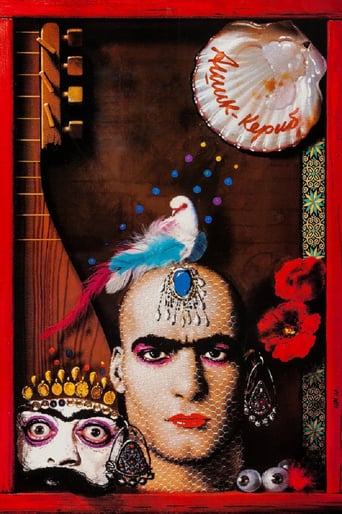Lee Eisenberg
Sergei Parajanov's final completed film is based on Mikhail Lermontov's short story about a poor minstrel who must travel for 1,000 days before he is allowed to marry the daughter of the local ruler. Like Parajanov's earlier "Color of Pomegranates", "Ashik Kerib" (which Parajanov dedicated to his friend Andrei Tarkovsky) makes ample use of the visuals and goes long periods without speech. Basically, it tests your attention span; a far cry from Michael Bay's movies.I wouldn't go so far as to call this movie a masterpiece, but I like that it shows us a culture that we don't often get to see. The culture in this case is Azerbaijan. Parajanov had focused on Armenia with "The Color of Pomegranates", and Ukraine and Georgia with other movies. His refusal to incorporate socialist realism into his works caused friction with the Soviet authorities (as did his bisexuality).In the end I recommend "Ashik Kerib". I wonder where Parajanov's career would've gone had he lived longer.
Michael Neumann
Another odd, exotic fable from the Soviet Union's most enigmatic filmmaker, set this time in a storybook past where, to win the hand of his true love, a penniless minstrel is forced to wander for a thousand days in search of wisdom and enlightenment. Parajanov is one of the leading figures in his country's so-called 'poetic cinema movement', which means his films are crude, heavily stylized rites of passage, thick with symbols and anachronisms. The naive, almost primitive formality recalls both the ancient, ritual folklore of its Central Asian setting and the cheap conventions of early silent film melodrama, with the Georgian voice-over narration (added on top of Parajanov's post-dubbed Azerbaijani dialogue) giving the film an added level of weirdness. On his magical quest the lovelorn troubadour encounters a blind wedding party, a despotic sultan with a toy machine gun toting harem, a pantomime tiger, and survives various other trials and tribulations, all to a nerve-racking background of wailing Middle Eastern music.
fergalff
Oh God......I love Alim Qaismov and Mugham music. I've traveled in Armenia and Georgia and fell in love with the Caucasus. I looked forward to seeing this film so much.....oh god!!!! Yes the music is interesting, but the problem is simply this; it looks like a Boy George video...and one made by some guy he met in a pub. I have never, in all my life seen such an inept, appalling and entirely worthless aberration such as this. Really. It's quiet stunning how bad this is. Like a home movie from a transvestite wedding. During the dire extras documentary on Paradjabov, he makes quiet an extraordinary statement; "It is not possible to become a Director, you must be born one. And it is not enough to be born a Director...your mother must be an actress." That makes as much sense as this bag of offal. If there were truth in that, on evidence of this film I'd say the only acting Mrs Paradjanov did so, was telling her son he had talent.
senermoruk
This is an excellent movie as far as the artistic and aesthetic dimensions are concerned and I would recommend it to anyone with an interest in experiencing the beauty of the Caucasus, or beauty as such. I do not think that there is any need to stress Parajanov's unique depiction of this beauty, after all he is acknowledged (deservedly) as one of the greatest directors of the 20th century. I am not quite sure, however, whether 'Western' audiences will be overwhelmed by Ashik Kerib (by the way 'Ashik' means 'lover', or more accurately, a person who is in love - Kerib corresponds to Turkish 'Garip'= the unfortunate). I showed it to some German friends of mine but they did not seem to be touched by it at all. 'Some' ethnological interest, if not knowledge (and passion) are indispensable. There is only one thing about Parajanov himself which I found irritating. In the documentary which is included in the Rusico edition, Parajanov himself claims to have pursued an ethnological approach in his films - as opposed to the Socialist Realism of his time which he despised so much. But how come that Parajanov says that KURDS are no Muslims when the majority of 90% of Kurds ARE (Sunnite) Muslims when he himself underlines the ethnological aspects of his movies?? How come we have a religious guy who is seen semi-nude (in Islam the exposure of a man's upper part of the body likewise constitutes sin). I did not expect a 100% accuracy watching this movie, and I still prefer it to The Shadows of Our Forgotten Ancestors and even to Sayat Nova despite its so many flaws (esp. the clothes and customs of the people, surely due to the 'tight budget'). The beautiful language spoken in the film is, of course, NOT Georgian - it's Azeri.


